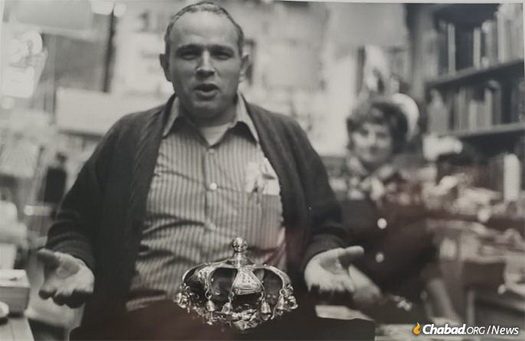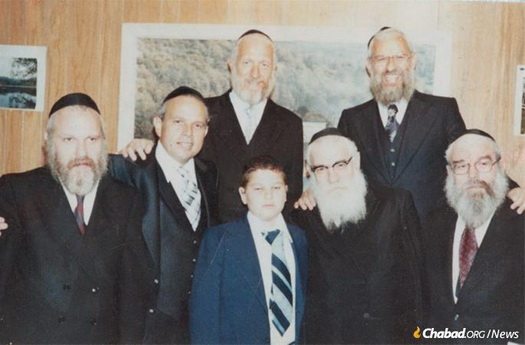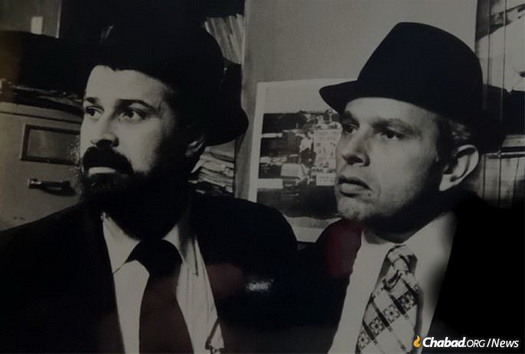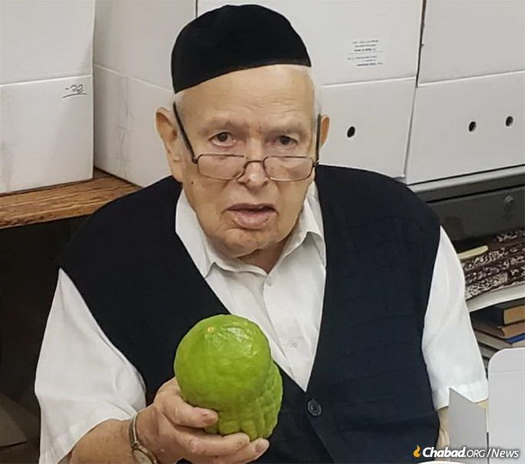
Obituary: Rabbi Sholom Hecht, 92, Beloved Brooklyn Judaica Merchant
by Menachem Posner – chabad.org
Rabbi Sholom Hecht opened Hecht’s Judaica on Coney Island Avenue in Brooklyn, N.Y., in 1969, but his first foray into the business was nearly 20 years earlier, in 1950. Back then, just a few months after the Rebbe, Rabbi Menachem M. Schneerson, of righteous memory, assumed leadership of the Chabad-Lubavitch movement, the new Rebbe needed a silver goblet of a specific size to be used for Passover. Young Sholom Hecht spared no effort in getting it.
The youngest of the six legendary Hecht brothers, who filled prestigious rabbinic pulpits on the East Coast and Chicago, he was among the few individuals to enjoy an “open-door policy” in the Rebbe’s study, where he was free to visit whenever he felt the need.
Sholom Hecht was born in Brooklyn in 1928 to Shea (Yehoshua) and Soochie (Sarah) Hecht, stalwart Chassidim of Galician descent, who, along with their sons, became staunch admirers of the Sixth Rebbe of Chabad—Rabbi Yosef Yitzchak Schneersohn,of righteous memory.
Hecht’s father was born in an America where it was difficult to maintain a religious Jewish lifestyle, and the family was unique in its continued fealty to Torah and mitzvah observances despite the prevailing atmosphere. Sholom would often give away his bed for weeks at a time for the visiting rabbis collecting funds for the poor of the Old Country staying in the Hecht home, where they were assured food that met the most exacting standards of kosher and an atmosphere filled with Torah study and Chassidic warmth.
Like his brothers before him, Sholom studied in the Chaim Berlin and Torah Vodaas yeshivahs. After the Sixth Rebbe came to America in 1940 and re-established the central Lubavitcher yeshivah in Brooklyn, Sholom was among its first students.
As a youth, he watched as his brothers took up pulpits and educational positions, following the directive of the Sixth Rebbe, who urged his students to bolster Judaism and Torah education wherever they might be.
While still a teen, he was appointed rabbi of the Penn Street Synagogue in the Williamsburg neighborhood of Brooklyn. Every week, he would consult with the Sixth Rebbe’s son-in-law, Rabbi Menachem Mendel, who supplied him with material for his sermon.
They continued to enjoy an unusually close relationship after the Sixth Rebbe passed away in 1950.
Just two months later, on the eve of Passover, Sholom met with his brother, Rabbi Yaakov Yehudah (J.J.) Hecht, already a respected pulpit rabbi and community activist. J.J. excitedly shared with his brother that Rabbi Menachem Mendel, had asked him to procure a silver tray to serve as his seder plate. Although Rabbi Menachem Mendel had not yet formally accepted his new role as Rebbe, J.J. understood the silver plate, usually reserved for the Rebbe, to be a sign that he was acknowledging his new position.
Along with the tray, the Rebbe had also requested a kiddush cup that held a specific quantity of wine. Sholom volunteered to find just the right one and spent the afternoon trudging across the Lower East Side from one Judaica store to another. Late in the afternoon, prized goblet in hand, he triumphantly made his way back to the Rebbe’s study.
After the holiday, the Rebbe asked Sholom how much the goblet had cost so he could repay him, but the young man refused to divulge the price. He finally relented when the Rebbe threatened to make out a check according to his estimation if the true cost was not revealed.
A Special Instruction and Blessing for Children
In 1951, he married Joan (Chaya Gittel) Kofman, and the couple settled in Brooklyn, where Sholom joined his father in the garment business. As the years rolled by, they were not blessed with children.
As was common for his generation, Sholom Hecht used the name “Sidney.” During the legendary Purim farbrengenof 1958, the Rebbe turned to Hecht and encouraged him to use his Hebrew name, Sholom, which means “complete,” in the merit of which he would be “complete in body and soul” and be blessed with a child.
Within a year, the Hechts were the proud parents of their daughter, Rochel Chana, followed five years later by a son, Yehoshua (Shea).
In 1961, he opened a Judaica store, then called C&S Skull Cap Co. As a fellow shop owner, he would gently encourage the proprietors of the other businesses in the area to close on Shabbat.
Always on the lookout for people to inspire, he often introduced his customers to the Rebbe. After he brought a group of six searching young men to the Rebbe, the Rebbe told him that these efforts to spread and share Judaism were the conduit through which G‑d sent him his livelihood.
In 1967, Rabbi Yisrael Jacobson asked Hecht to join him in traveling to Italy to select and import etrogim grown in the Calabria region. After obtaining the Rebbe’s blessing, he began his annual trips to Italy, a practice that would continue for more than 50 years.
As he carefully inspected the trees to ensure that they were not grafted, he looked through the harvest searching for the best of the crop, which he would personally present to the Rebbe.
Special Items for the Rebbe
As a purveyor of fine Judaica, it was almost natural for the Rebbe to turn to him to provide the ornate gold and silver crown for a Torah scroll that was about to be completed. What was unusual, however, was that the Rebbe made the request for the custom-designed crown shortly before midnight and had complete confidence that Hecht would have it ready for him the following day.
It meant waking up his sleeping supplier to get samples to show the Rebbe at 1 a.m., stopping a factory production mid-morning to have the custom crown the Rebbe chose made, and then “driving through every red light,” but the crown was in the Rebbe’s office 15 minutes before it was needed.
Recognizing his devotion, the Rebbe once applied to him the rabbinic principle, chazakah shliach oseh shlichuto, even without confirmation, one can establish as a given that he surely carried out what he had set out to accomplish.
Every year on Chanukah and Purim, Sholom Hecht would take his children to visit the Rebbe. On Purim, they would bring along several crates of carefully selected sefarim (sacred books), which the Rebbe would then lovingly peruse and sort according to their content. Unlike his five elder brothers, Hecht did not enter the rabbinate full time. Instead, he used his influence as a businessman who daily dealt with people in search of holy books and religious items to uplift and inspire others.
“I remember how excited my father was when Rabbi Hecht joined our shul in Flatbush,” says Hindy Levine, who grew up attending Congregation Anshe Sefard, where Hecht served as rabbi, Torah reader, High Holiday cantor, shofar blower and more. “He brought so much enthusiasm and joy to everything that happened in shul.”
Levine recalls how on Simchat Torah, after the congregants had all had a bit of schnapps, Sholom would regale them with stories of his beloved Rebbe, whom he encouraged them to meet and develop a relationship with.
Gifted with a fine singing voice, he served as cantor for the High Holidays. As an adult, when Levine began praying at the central Chabad synagogue in Crown Heights, she realized that many of Hecht’s heartfelt tunes were classic Chabad melodies.
No matter how busy Hecht was with his various endeavors, he always made time to visit his mother and personally washed her floors every Friday in honor of Shabbat.
For many years, the Rebbe would distribute dollars to be given to charity following weekday farbrengens. The crisp bills were provided by Hecht, who relished the honor of partnering with the Rebbe in such a unique way. Once he had to convince a bank manager to reopen his bank after hours to retrieve the bills from the vault; after that, he made sure to always have a stash on hand.
Even though he enjoyed an “open-door policy,” he never lost his reverence for the Rebbe. Before he entered the Rebbe’s study, he would invariably pause to adjust his hat, tie and gartel, as if he was meeting the Rebbe for the very first time.
Rabbi Sholom Hecht passed away on 22 Tammuz, the yahrzeit of his father, Yehoshua Hecht. In addition to his wife and children, he left behind many grandchildren and great-grandchildren.

















